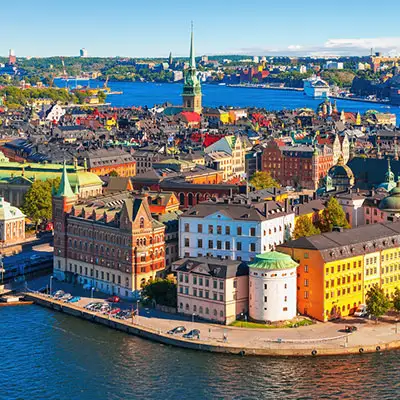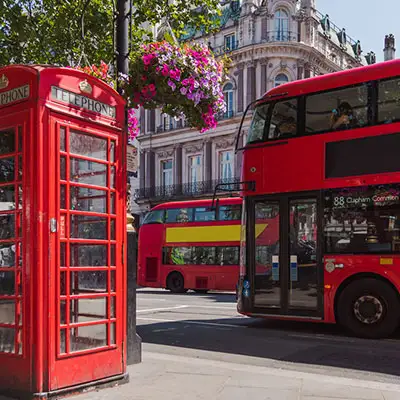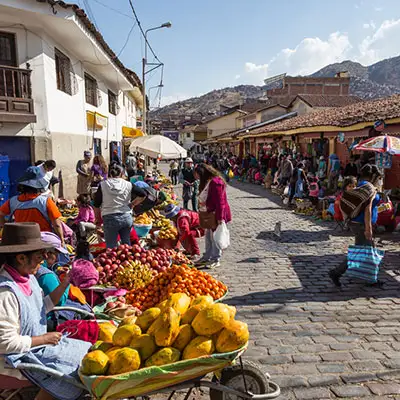First World Travel vs. Third World Travel, Explained
Luke Armstrong | Feb 23, 2021

When deciding between first world and third world travel, ask yourself some questions.
- Do you prefer paper, plastic, or banana leaf?
- Do rural scents instill in you a feeling of poetic wistfulness or concerned aversion?
- Would you like your hotel to take major credit cards or a living arrangement where an iPhone is payment?
- Would you prefer your taxi driver to have a license or to just be a guy with a horse and cart headed in the same direction as you?
- If your answers align with a single side of these questions, then odds are you fall cleanly into the category of first world or third world traveler.
While there has been some debate about whether "third world countries" is an offensive term, for our purposes, I prefer it to "developing countries.” Calling parts of the world developing countries implies that a specific, ethnocentric goal — an industry driven market with heavy investment in infrastructure — is something “underdeveloped” countries should be moving toward.
What's The Difference Between First World and Third World Travel?
In travel, first world and third world are moldable terms loosely applied to different places in an intuitive way. The terms usually differentiate between degrees of westernized infrastructure and socio economic development.

Canada, Sweden, Australia, Singapore, Japan, France, and Italy fall cleanly into the list of first world countries. There is consensus that Haiti, El Salvador, Bolivia, Papua New Guinea, and Uganda all fall under the third world definition.
But where do Panama, Morocco, Argentina, Mexico, and Greece fall? Depending on who you are talking to and what they are trying to say, these countries could go on either list.
Third world originally meant neither second world (communist global market) or first world (capitalist global market). Today, people only distinguish between the first world traveler and third world traveler.
In this article, these labels most obviously distinguish between expensive and inexpensive — which tends to correlate to whether or not horses make up a viable part of the public transportation system.
The Price Difference Between First World and Third World Travel
One of the biggest attractions of the third world is the price. Aside from the ticket to get there, you can have the adventure of a lifetime for the price of a paycheck.
In third world countries, you can travel well and far on a little. For example, once you arrive in Mongolia, you can buy a horse for $500, travel across the country on it, and stay and eat with nomads for a few dollars a night. You could never do this in England — so don't even try! Just be sure to be wary of horse bandits.
At the low end of the less-developed world, private rooms start at $5/night. Full meals are scarfed for $1. Luxurious hotel suites with butler service come at you at the same price as one night in a lacking first world motel room.
If cost is your biggest concern when planning a trip, and you aren't afraid of the Spartan side of adventure, then the third world is the place for your adventures to unfold.
Always Keep in Mind
When traveling in third world countries, be conscious of the ways you wield the power of privilege. Be actively aware of how to exercise it in an ethical way that appreciates and pays tribute to the culture you are visiting.
First World For Type A Personality, Third World For Type B Personality
When the bus runs a few minutes or hours late, do you stand around tapping your feet to the rhythm of your own restless anxiety? If the restaurant runs out of goat brain soup, are you willing to substitute deep-fried pig ears?
If you answered "yes" and "no, gross!" respectively then the first world — colonized land of predictable outcomes — is more for you than the third world — a wild land of uncaged strangeness.
For type A people who like to have a set plan in place — and see that plan carried out accordingly — the first world is where you can have your itinerary play out to its intended tune.
But if you find the unpredictable inescapable and consider sharing the bus ride with goats and Peruvian mukis a positive addition to your trip, then the less predictable outcomes of third world countries will be more your speed.

Is it Safer to Travel in the First World than the Third World?
This is sort of like asking, "Is it better to be locked in a cage with a tiger or a bear?" You can't answer this unless you know the tiger and bear in question.
Some frequent travelers might give this a simple, "yes," but this misses the mark of reality. There is no real answer to this question. We ask questions like this not for an answer, but for reassurance that things will be alright.
Countries are a case-by-case basis. Each has its own set of dangers and threats.
Guatemala is dangerous if you find yourself in Guate City with the wrong crowd on a bad night. But if you're enrolled at a yoga school overlooking peaceful shores of Lake Atitlan and live with a local family that goes to bed by 9pm, you could live a lifetime without incident.
In the most general terms, you can travel just as confidently in the third world as the first world, if you do your research, take precautions, and make good decisions. There are more pickpockets in Berlin than all of Belize. I'd feel safer in a back alley of Havana at 3am than being on Broadway in NYC. While El Salvador has a reputation for guns, the only place I've had one pulled on me was in the suburbs of Minneapolis.
Don't take this as a license to go anywhere without worrying about safety. Safety is always your primary concern. When you put in the time to research a place — be it first or third world countries — you'll come away with an understanding of what you're up against and what you need to do to keep yourself on the right side of alright.
Get in with the Locals in the Third World
Never once walking the streets of Iceland did someone exit their house to usher me in for dinner. In rural Kenya, this occurred twice.
Never on a first world bus did the family next to me invite me to stay the week with them. But on the way from Chile to Lima, I made an unexpected week stop-off in Lima to live with a wonderful family who fed me Guinea pig and potatoes.
At a university in Amsterdam, I was invited to sit in on a cross-cultural communications class. And at a school in Havana, teachers invited me to a classroom after hours to drink rum and dance the salsa.
I could add a dozen more anecdotes to the list, but the just of it is the third world is much more open and embracing of foreigners than much of the first world. Locked into busy modern lives, the developed world by and large ignores the out-of-towners rolling through. This is not the case in countries where life is focused on family and fun instead of "Family Guy" and funds.
We could spend an interesting semester at a table of cultural anthropologists and sociologists to get a fuller idea of what makes this a matter of fact. For our purposes here, suffice it to say it is a confirmed rule of thumb that the countries called third world win first place in the hospitality awards.

If you are not just looking to visit a place, but want to know its people and enmesh yourself in the spectacle of life as it plays out somewhere else, then third world travel may just be what you are looking for.
By now, an astute reader has suspected my own bias on the matter — the third world is my particular forté.
It's the third world countries — paises del tercero mundo — where I've experienced lifetimes of encounters with the new and unexpected. Trips to the third world are the travels that awakened me to new understandings and challenged me in shocking and humorously absurd ways.
For every raccoon that's mauled me in Guatemala, there's been a family in the Philippines who has welcomed me into their home and made me their newborn daughter's godfather — and while only one of these incidents left me scarred, I value them both the same.
Purchase Travel insurance
Seven Corners provides a variety of travel insurance plans for tourists and visitors as they travel internationally. Learn more here.

About the Author
Luke Maguire Armstrong is the author of "The Nomad's Nomad." He has spent the last decade traveling, writing and designing, and funding philanthropic programs around the world.
Search Posts
Receive our monthly inspiration and travel tips from the travel insurance experts.
Sign me upThis website and various social media updates provided by Seven Corners contain content, information, articles, videos, and links to websites created by third parties. Seven Corners, its owners, and its employees neither endorse nor are responsible for the accuracy, timeliness, or reliability of any third-party information, statements, opinions, or advice and are not liable for any loss, harm, or damage caused by your reliance upon them. Use of such information or the linked websites is entirely at your risk. Concerns regarding this third-party content should be directed to the third party. Seek professional advice, as appropriate, regarding your use of such information and websites.
Because the information on this website and in Seven Corners’ blogs and other social media is written and compiled using knowledge and information available at a certain point in time, it may become outdated. For that reason, information, events, legal requirements, and product changes (including benefits, limitations, exclusions, and services) may not be up-to-date, complete, or accurate at the point in time it is being read. Again, use of such information is at your risk.
